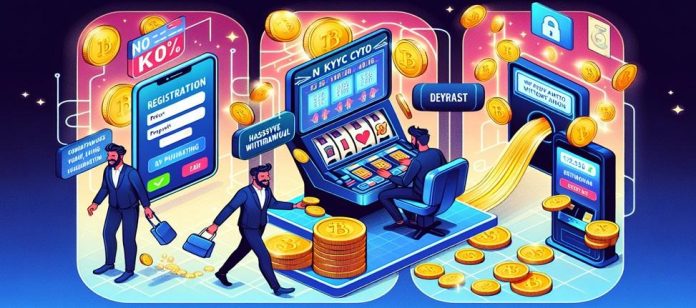As online gambling continues to evolve, one of the most controversial and intriguing developments is the rise of casinos no KYC—platforms that allow users to gamble with cryptocurrency without undergoing the standard Know Your Customer (KYC) identity verification process. These casinos promise anonymity, fast withdrawals, and global access. But what many players wonder is: Are no KYC crypto casinos legal? Let’s dive into the legal landscape and explore what you really need to know.
Understanding KYC in Online Gambling
Know Your Customer (KYC) is a regulatory requirement where online platforms must verify the identity of their users. This typically involves submitting personal documents like a passport or utility bill. KYC is essential for:
-
Preventing money laundering
-
Combating fraud
-
Ensuring underage individuals cannot gamble
Most licensed online casinos adhere to strict KYC guidelines to comply with laws in their jurisdiction. However, casinos no KYC skip this process, raising red flags among regulators and law enforcement agencies.
The Legal Status: It Depends on Jurisdiction
There is no universal answer to the legality of casinos no KYC—it heavily depends on where you live and where the casino is operating from. Some key points to consider:
-
In jurisdictions with strict gambling regulations like the UK, USA, and many EU countries, operating or even using a no KYC casino could be considered illegal.
-
In less-regulated territories or regions with lenient crypto laws, these casinos may legally operate and accept international players without enforcing identity checks.
These platforms often base their servers in offshore jurisdictions, such as Curaçao or Costa Rica, where regulation is minimal and enforcement is loose.
Cryptocurrencies: The Double-Edged Sword
The use of cryptocurrencies like Bitcoin or Ethereum in casinos no KYC adds another layer of complexity. Since crypto transactions are decentralized and harder to trace, they offer players privacy but also allow these casinos to bypass financial regulations.
However, regulatory bodies are catching up. Many countries are starting to enforce Anti-Money Laundering (AML) rules on crypto transactions, meaning even anonymous casinos may soon fall under legal scrutiny.
Risks Involved with No KYC Crypto Casinos
While the promise of anonymity is attractive, it comes with significant risks:
-
No Player Protection: Without regulatory oversight, there’s little recourse if a casino fails to pay out winnings.
-
Scams and Fraud: Some unlicensed no KYC casinos may be outright fraudulent.
-
Legal Consequences: Playing on such platforms may violate local gambling laws, potentially leading to fines or other penalties.
The Appeal of No KYC Casinos
Despite the risks, many users are drawn to casinos no KYC for several reasons:
-
Instant Sign-Up and Withdrawals: No waiting days for document checks.
-
Anonymity: Ideal for users concerned about privacy or data leaks.
-
Global Access: Many block access based on location, but no KYC casinos often don’t enforce geo-blocking.
This blend of freedom and convenience is part of what makes these platforms so attractive—yet legally murky.
The Future of No KYC Gambling
The future for casinos no KYC remains uncertain. As governments tighten regulations on crypto and online gambling, many of these platforms may face increased pressure to comply or shut down. Some are beginning to offer hybrid models—where KYC is optional until you exceed certain withdrawal limits.
In the long term, complete anonymity may become incompatible with evolving global compliance standards, pushing the industry towards more transparency.
Final Thoughts: Proceed with Caution
So, are casinos no KYC legal? The short answer is: sometimes, but legality depends on your location and the regulatory status of the casino. While these platforms offer anonymity and ease of use, they often operate in a legal gray area and come with considerable risks.
If you choose to gamble on a no KYC crypto casino, make sure you understand the legal implications in your country and exercise extreme caution. In the world of online gaming, freedom often comes with a price—and in this case, it may be your safety, your funds, or even your legal standing.




